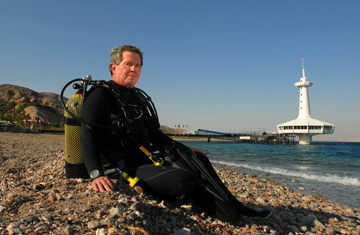
As a youngster in Israel, Benjamin Kahn's greatest pleasure was to go snorkeling with his dad in the Red Sea. The reefs of Eilat were an underwater wonderland, where forests of coral teemed with sea horses and with schools of pulsing, multicolored fish that looked as though they had been splashed by a clown's paintbrush.
Kahn studied marine biology and left Israel for the U.S. and Australia to help tend the investments of his father, Morris, a software and telecommunications billionaire. When he came back in 2000 to live in Israel and dive again regularly in the sea of his childhood, Kahn was horrified by what he saw: the once-azure water was now murky. The Red Sea reef had possessed the greatest variety of coral and undersea life anywhere in the world. But most of the vibrantly colored fish were now gone. All but the hardiest of 30 coral species had died off, and the reef itself had withered into a sandy, underwater boneyard. "I knew that if the reef was going to survive, someone had to fight for it," says Kahn.
He was uniquely placed for the battle: he had expertise (his family owns seven giant aquarium parks around the world, including one in Eilat) and he had lots of money. First, Kahn tapped his family's marine-park scientists to come up with new ways of regrowing the battered coral. Today, after every storm, Kahn and his divers collect the fragments and give them to 5,000 school kids to grow like saltwater saplings for months in classroom tubs. Then divers carefully glue the living fragments back onto the reef.
But his toughest fight was on land, against politicians and businessmen. Kahn's experts figured out that the reef began dying when giant fish farms, which provide 15% of the fish on Israeli tables, were built in 1997. These cages were spewing tons of uneaten food and excrement onto the reef. "It was the same as if a town of 60,000 people were dumping its sewage straight into the sea," says Kahn. Acting through Zalul, an Israeli clean-water advocacy group, Kahn fought the powerful lobby of fish-cage owners in the courts and won. A third of the cages were dismantled last year, and the Israeli courts ruled that remaining cages must be cleared away by mid-2008. "When all the cages are gone, maybe the reef can revive itself," says Kahn. "It's our only chance to regain the amazing vibrancy the reef once had." Meanwhile, Kahn can usually be found several fathoms down, tending his reef like a deep-sea gardener.